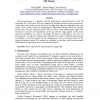Free Online Productivity Tools
i2Speak
i2Symbol
i2OCR
iTex2Img
iWeb2Print
iWeb2Shot
i2Type
iPdf2Split
iPdf2Merge
i2Bopomofo
i2Arabic
i2Style
i2Image
i2PDF
iLatex2Rtf
Sci2ools
109
click to vote
ICISP
2010
Springer
2010
Springer
Correction of Left Ventricle Strain Signals Estimated from Tagged MR Images
Strain measurement is a quantity used for assessing the regional function of the left ventricular (LV) of the heart. They are computed by tracking the motion of the non-invasive, virtual tags in the cardiac muscle with time. Tracking these tags gives information for each region of the cardiac muscle by quantifying its deformation during contraction (systolic period) and relaxation (diastolic period). However, these strain measurements suffer from inaccuracies caused by the degradation of the tags and the image quality. In this work, numerical simulations are used to investigate the factors contributing to the error in measurements. An empirical model for the estimated strain values is deduced and presented. In addition, a correction method for the measurement errors is proposed based on the empirically-deduced model. The method was validated on real data, and showed potential enhancement by reducing the errors in strain measurements.
Cardiac Muscle | ICISP 2010 | Image Processing | Measurements | Tags |
Related Content
| Added | 26 Jan 2011 |
| Updated | 26 Jan 2011 |
| Type | Journal |
| Year | 2010 |
| Where | ICISP |
| Authors | Mina E. Khalil, Ahmed S. Fahmy, Nael F. Osman |
Comments (0)

